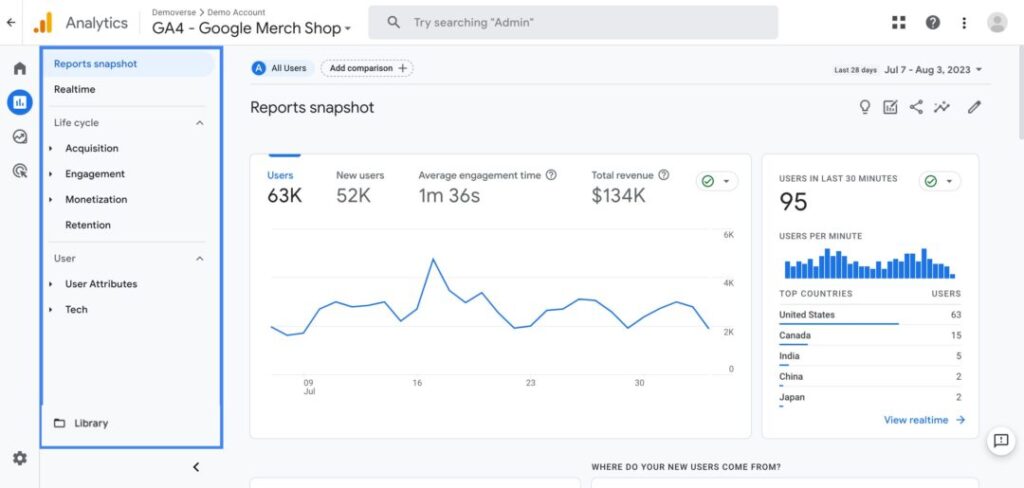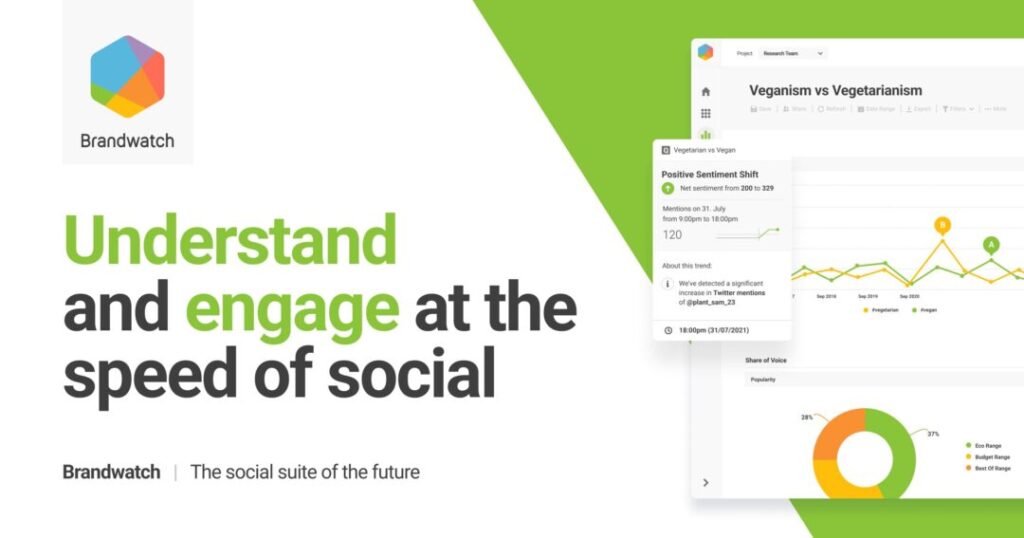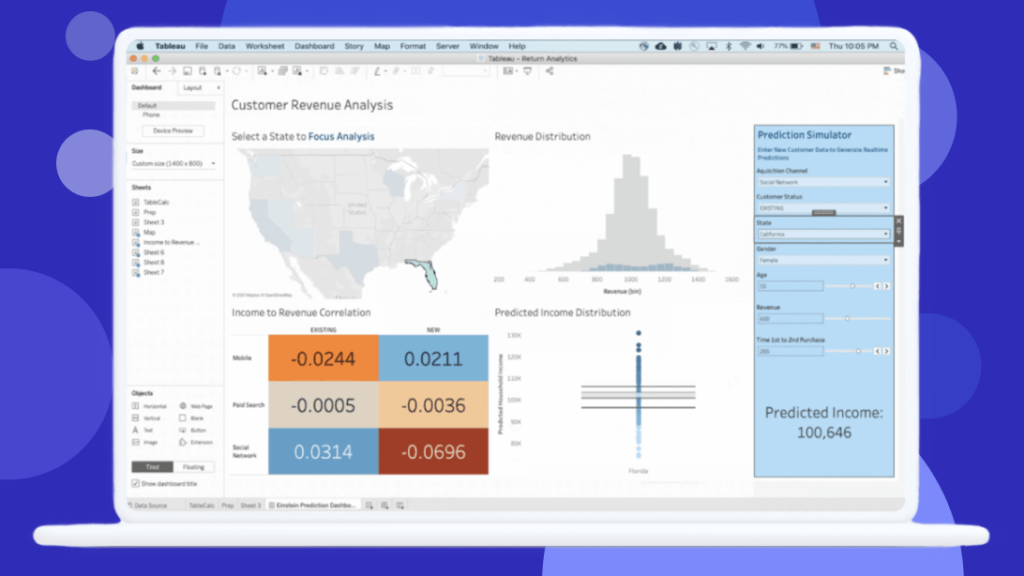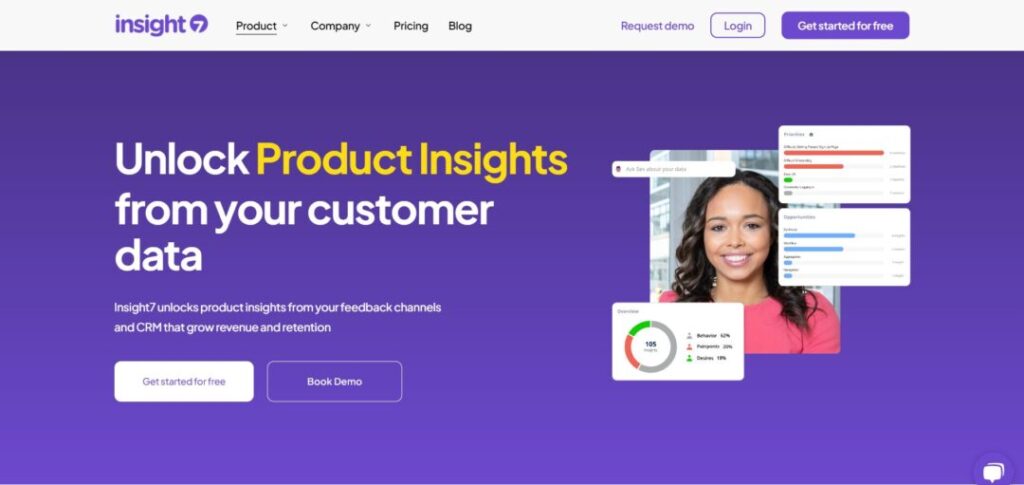AI Tools for Data Analysis and Marketing are a powerful category of software applications that leverage artificial intelligence to extract insights from data and automate marketing tasks. These tools can be used across various stages of the marketing funnel, from understanding your audience to optimizing your campaigns and measuring results.
Here’s a breakdown of the key functionalities of AI Tools for Data Analysis and Marketing:
Data Analysis:
- Customer Segmentation: AI can analyze customer data to segment your audience into distinct groups based on demographics, interests, behavior, and other relevant factors. This allows for targeted marketing campaigns that resonate better with specific customer segments.
- Customer Journey Mapping: AI tools can analyze customer interactions across different touchpoints (website, social media, email) to understand the customer journey and identify areas for improvement.
- Market Research and Trend Analysis: AI can analyze vast amounts of market data to identify trends, predict customer behavior, and uncover new marketing opportunities.
- Marketing Attribution Modeling: AI can help you understand which marketing channels are driving the most conversions and optimize your marketing budget allocation.
Marketing Automation:
- Content Creation: Some AI tools can generate content ideas, write different content formats (blog posts, social media captions, ad copy), and personalize content for different audience segments.
- Campaign Management: AI can automate repetitive tasks in campaign management, such as scheduling social media posts, sending email campaigns, and A/B testing different marketing elements.
- Lead Scoring and Lead Nurturing: AI can analyze customer data to score leads based on their likelihood to convert and automate personalized nurturing campaigns to move them through the sales funnel.
- Real-Time Performance Monitoring: AI tools can provide real-time insights into campaign performance, allowing you to make adjustments and optimize campaigns on the fly.
Benefits of Using AI Tools for Data Analysis and Marketing:
- Improved Decision-Making: Data-driven insights from AI can help you make informed marketing decisions and optimize your marketing efforts for better results.
- Increased Efficiency: AI can automate repetitive tasks, freeing up your marketing team’s time to focus on creative strategies.
- Personalized Marketing: AI allows for more targeted and personalized marketing campaigns, leading to higher engagement and conversion rates.
- Measurable ROI: With better data analysis, you can track the impact of your marketing campaigns and measure your return on investment (ROI).
Overall, AI Tools for Data Analysis and Marketing are revolutionizing the way businesses approach marketing. By leveraging the power of AI, businesses can gain valuable insights from data, automate tasks, personalize marketing efforts, and achieve better marketing results.
The Best AI Tools for Data Analysis and Marketing in 2024
Here are our picks for the best AI tools for data analysis and marketing in 2024.
1. Salesforce Einstein

Salesforce Einstein is an AI technology designed by Salesforce to facilitate complex administrative tasks, provide predictive analytics, and enhance customer experiences. It leverages machine learning, natural language processing, and predictive modelling.
Here are some of the significant features of Salesforce Einstein:
- Einstein Automate: This feature helps automate workflow and repetitive tasks, freeing up staff to focus on more strategic tasks.
- Computer Vision: Salesforce Einstein uses computer vision to analyze images for insights, automating processes and offering new perspectives.
- Natural Language Processing: Einstein’s AI can understand and process human language, thereby enhancing the way businesses communicate and interact with their customers.
- Einstein Account Insights: This feature offers real-time insights about accounts to help sales teams prioritize and personalize their efforts.
- Einstein Forecasting: Einstein can predict and display business metrics, forecasting sales revenues and business growth.
- Einstein Lead Scoring: This feature allows a company to prioritize leads based on the likelihood of converting to opportunities, thereby enhancing sales efficiency.
- Service Analytics: Salesforce Einstein provides analytical insights about a business’s service operations, helping in the decision-making process.
- Einstein Article Recommendations: Powered by AI, Einstein offers targeted article recommendations to improve service quality and customer satisfaction.
- Data Mining: Einstein helps businesses sift through vast amounts of data, discovering patterns and deriving actionable insights.
- Predictive Intelligence: Salesforce Einstein uses AI to foresee customers’ behavior and needs, allowing for a more personalized and proactive approach to sales and customer service.
In conclusion, Salesforce Einstein is a powerful AI technology that can power up your sales, customer service, and marketing efforts. Through its advanced features, it equips businesses with intelligent tools necessary for streamlined operations and superior customer service. By automating repetitive tasks, offering predictive insights, and personalizing customer interactions, Salesforce Einstein helps businesses stay ahead of the curve. If you aim to leverage AI for business growth, Salesforce Einstein is worth considering.
2. Albert.ai

Albert.ai is an AI-powered marketing platform that leverages advanced algorithms to automate, optimize and analyze digital advertising campaigns. It is designed to enhance marketing efforts with precision, persistence and intelligence.
Here are some of the key features of Albert.ai:
- Channel Management: Albert.ai enables you to manage multiple distribution channels, build relationships with channel partners, and track their performance.
- Speech Recognition: It has speech recognition capabilities providing an additional form of data for analytical purposes and customer interactions.
- Multi-Campaign Management: Albert.ai lets you run multiple marketing campaigns simultaneously with ease, optimizing each based on real-time performance.
- Multi-Channel Marketing: It supports multichannel marketing, allowing marketers to reach audiences through various platforms.
- Multivariate Testing: Albert.ai can conduct multivariate testing to find out the best combination of factors affecting the outcome of marketing campaigns.
- Predictive Analytics: It provides predictive analytics, giving data-driven insights and forecasts for more informed decision-making.
- ROI Tracking: Albert.ai tracks the return on investment in real-time for each marketing effort enabling data-driven decisions.
- Personalized Ads: It personalizes and optimizes ads for micro audiences, improving the relevancy and engagement of marketing campaigns.
- Advertising Optimizations: One of the core features of Albert.ai is it constantly tests and optimizes your advertising efforts, enhancing the effectiveness of your campaigns.
- Real-Time Data and Insights: Albert.ai provides real-time data and insights, allowing companies to be more responsive to changing market conditions.
In conclusion, Albert.ai is a robust AI marketing platform that leverages advanced technologies to streamline and enhance marketing operations. Its features, from multivariate testing to predictive analytics and ROI tracking, make it a comprehensive solution for businesses that aim for data-driven marketing strategy and improved ROI. With its capability to manage and optimize digital advertising campaigns in real-time, Albert.ai is an invaluable tool in a marketer’s arsenal.
3. HubSpot

HubSpot is a comprehensive customer relationship management (CRM) platform that provides software and services for inbound marketing, sales, and customer service to help businesses grow better. HubSpot offers a full platform of marketing, sales, customer service, and CRM software to help businesses streamline their operations and enhance their customer experiences.
Here are some of the key features of HubSpot:
- Contact Management: HubSpot allows you to manage your contacts and capture detailed information about your leads and customers.
- Website Activity Tracking: It tracks and records user activities on your website to understand how your audience interacts with your content.
- Opportunity Pipeline (Deals): HubSpot provides a visual pipeline to track and manage your sales opportunities.
- Task Management: With HubSpot, you can create, assign, and manage tasks to ensure that your team stays organized and efficient.
- Email Marketing: HubSpot offers a comprehensive email marketing solution, allowing you to create, send, and track email campaigns.
- Landing Pages: You can create and optimize landing pages, which are essential for capturing leads and driving conversions.
- Blog and Content Management: HubSpot enables you to publish and optimize blog posts and other content to drive traffic and generate leads.
- Integration: HubSpot seamlessly integrates with other tools and platforms, increasing efficiency and collaboration.
- Automated CRM Database: It maintains an automated CRM database, eliminating manual entry and ensuring that your team always has up-to-date contact and company information.
- List Segmentation: HubSpot allows you to segment your contacts into various lists based on criteria like demographics, behavior, and other data, enabling efficient and targeted communication.
- Paid Ad Tracking: HubSpot provides the ability to track the performance of your paid ads, giving you insights to optimize your advertising strategy.
- Free Web Hosting: As part of its offering, HubSpot provides free web hosting, making it a one-stop solution for businesses.
In conclusion, HubSpot is an all-inclusive, user-friendly platform geared to drive business growth with its powerful CRM, marketing, sales, and customer service solutions. Its robust features make it easy for businesses to manage their contacts, create and track marketing campaigns, streamline sales processes, and deliver excellent customer service. Whether you’re a small business or an enterprise, HubSpot provides a comprehensive set of tools to help you grow better.
4. Google Analytics

Google Analytics is a robust analytics tool from Google that allows website owners and digital marketers to understand how users engage with their websites or apps. It collects and presents user-interaction data, giving insights to improve user experience, track conversions, and make data-driven decisions.
Here are some key features of Google Analytics:
- USER DATA: Google Analytics provides a wealth of user-specific data including location, language, device used, browser information, session duration, pages per session, and bounce rate.
- REPORTING & VISUALIZATION: Google Analytics offers a variety of customizable reporting features. Data can be represented visually using charts, tables, and maps.
- FUNNEL ANALYSIS: The tool enables you to monitor the steps users take to complete a task (such as making an online purchase) and see where they’re dropping out, helping you improve user experience and conversion rates.
- Tag Management: Google Analytics allows you to use tags (code snippets) to measure traffic and optimize your marketing campaigns.
- SMART GOALS: This feature uses machine learning algorithms to generate conversion goals and help you identify the top-performing segments of your traffic.
- DATA ACTIVATION: Google Analytics allows you to put the data into action by integrating with AdWords, AdSense, Google Display Network, and more.
- Advertising Reports: Google Analytics provides insights into how your advertising campaigns are performing and the efficiency of your marketing funnel.
- REAL-TIME DATA: This feature allows you to see how people are interacting with your site or app in real-time.
- Cross-Platform Tracking: In Google Analytics 4, unified measurement is provided across apps and websites, enhancing your understanding of the user journey in a multi-device world.
In conclusion, Google Analytics offers an array of features to help businesses understand their users’ behavior and make data-driven decisions to enhance website performance and marketing strategies. With its easy-to-use interface, customizable reporting, and in-depth analysis, it’s become an indispensable asset for both small and large businesses to monitor and optimize their digital assets. Whether you wish to optimize your marketing efforts, improve user experience, or enhance conversion rates, Google Analytics serves as a comprehensive solution.
5. Pardot

Pardot is a marketing automation solution developed by Salesforce that enables businesses to create, deploy, and manage online marketing campaigns. It is particularly well-suited to B2B marketing scenarios, offering sophisticated lead generation and management capabilities, and powerful analytics to track engagement and effectiveness.
Here are some of the key features of Pardot:
- Marketing Automation: Pardot provides an easy-to-use platform to create and automate marketing campaigns, helping organizations boost their reach and efficiency.
- Engagement Studio: This feature helps in creating customer paths, and allows for the automation and personalization of customer journeys based on real-time user behavior.
- Lead Generation & Management: Pardot assists in generating and managing leads, facilitates lead nurturing, and helps in moving prospects through the marketing funnel.
- Email Marketing: Pardot provides comprehensive email marketing capabilities, allowing for the creation, deployment and analysis of email campaigns.
- Personalization: With Pardot, you can provide personalized experiences to your visitors based on their actions, behaviors, and preferences.
- Segmentation: Pardot allows you to segment your audience into different groups based on their behavior, engagement, demographics, and more.
- Unlimited Landing Pages: Pardot offers a platform to create unlimited landing pages to engage and convert your audience.
- Dynamic Content: This feature enables you to provide dynamic content that changes based on the audience’s behaviour.
- Lead Scoring & Grading: Pardot helps evaluate the quality of leads by providing quantitative scores and subjective grades based on their readiness to convert.
- Analytics: Pardot’s robust analytics tools offer valuable insights into campaign performance and user behavior, enabling data-driven decision making.
- Connected Campaigns & User Sync: Pardot allows for seamless integration with Salesforce campaigns, ensuring data consistency and eliminating data silos.
In conclusion, Pardot provides a comprehensive marketing automation solution that empowers businesses to create effective marketing campaigns, streamline lead generation, and provide personalized user experiences. Its suite of powerful features ensures organizations acquire, nurture, and convert leads more efficiently. By alignifying marketing efforts with sales goals, Pardot helps businesses optimize their revenue potential, making it a valuable tool in the B2B marketing landscape.
6. Brandwatch

Brandwatch is a powerful social media monitoring platform that provides a host of features to satisfy the needs of any modern digital consumer.
Features of Brandwatch:
- Social Media Monitoring: This is a noteworthy feature of Brandwatch. It helps to keep an eye on various aspects of social media activities.
- Automatic Demographic Information: Brandwatch automatically uncovers the gender, interests, profession, and location of the authors in your data.
- Automated Classification of Data: This feature, referred to as Entities, is used to sort and classify data.
- Brandwatch Social Panels: This is a relatively new feature that allows users to create an online opinion research panel.
- Social Media Management: Brandwatch serves as a social media listening, engagement, publishing, advertising, and customer management data platform.
Brandwatch is considered one of the most comprehensive social listening and monitoring tools available. It offers a wide range of capabilities that cater to various business needs, thus enhancing user understanding of their audience, their preferences, opinions, and more, ultimately leading to a better understanding of their customer base. User reviews indicate high satisfaction with the tool, citing its extensive features and functionality.
7. Akkio

Akkio is a pioneering platform in the AI and machine learning realm, designed to make the implementation of artificial intelligence effortless, even for non-technical users. It aims to democratize the usage of AI in daily business operations and decision-making processes. Here are some of its salient features:
- Ease of use: Akkio is designed such that you don’t need any technical skills to use it. Anyone can easily create, deploy, and use AI models with its intuitive interface, in just a few minutes.
- Versatility: Akkio allows users to predict a wide range of scenarios from sales forecasting to anomaly detection. You can make inferences about everything—from churn prediction to detecting fraud.
- Efficiency: The platform allows performing complex AI operations on a simple, user-friendly interface that streamlines operations and minimizes time expenditure.
- Integration: Akkio easily integrates with your existing workflows and systems. It supports various import and export formats and can connect with other software through Zapier.
- Team collaboration: Akkio facilitates collaborative efforts. You can easily share your AI models with team members or across your entire organization.
- AI Flow Builder: Akkio’s AI Flow Builder lets you visually create AI processes by combining action blocks in a drag-and-drop interface. It’s incredibly user-friendly and intuitive.
- Forecasting capabilities: Akkio is excellent for predictive analytics, providing accurate forecasts based on historical data.
Remember, Akkio’s ultimate goal is to enable every business to leverage the power of AI efficiently and effortlessly.
8. Tableau

Tableau is a leading data visualization and business intelligence tool used widely across the globe in diverse industrial sectors. It’s designed to make data visualizing, reporting, and sharing more accessible, intuitive, and efficient. Here are some of its key features:
- Data Visualization: Tableau is renowned for its data visualization capabilities. It transforms cumbersome data into comprehensible visuals, allowing you to understand and interpret data better.
- Real-time Analysis: Tableau has the feature to offer real-time analysis. It keeps your data updated, ensuring you’re making decisions based on the most current data.
- Data Blending: Tableau has unique data blending features that allow you to blend data from various sources into one integrated view.
- Collaboration and Sharing: With Tableau, you can share dashboards, story points, and visualizations with your team for collaborative interpretation and decision-making.
- Interactive Dashboards: Tableau constructs interactive dashboards that convey complex facts straightforwardly. Users can drill down data and segment it to get the finer details.
- Mobile Readiness: Tableau offers mobile-ready dashboards, which ensures you can access your data anytime, anywhere.
- Security: Tableau provides robust security measures, such as User Filters and Data source certifications, to ensure your data is secured.
- Integration: Tableau integrates with a variety of data sources, including CSV, Excel, Google Sheets, and SQL databases, as well as Big Data processors like Hadoop.
- Ease of Use: Tableau is known for its user-friendly interface, which allows users to drag-and-drop to analyse data, create interactive dashboards, and more.
In short, Tableau is an incredible tool for anyone looking to leverage their data for actionable insights in an easily interpretable, visual, and interactive way.
9. Surfer SEO

Surfer SEO is a cloud-based on-page optimization tool that takes a data-driven approach to SEO. It’s designed to assist with the optimization of written content, including blog posts and articles. It leverages data from the highest-ranking pages for a given query to guide the content creation process. Here are some key features of the Surfer SEO:
- Content Editor: Once you enter your primary keyword into Surfer’s Content Editor, it generates a writing guideline, covering recommendations for important terms to include, word count, and more.
- SERP Analyzer: By analyzing the top-ranking pages for your main keyword, the SERP Analyzer provides insights on the factors correlated with ranking higher, including backlink data, time on page, loading speed, etc.
- Keyword Research: Surfer helps refine your keyword strategy, suggesting different variations of the keywords and long-tail keyword ideas.
- SEO Audit: It audits your pages, comparing them with high-ranking pages, and provides recommendations to make necessary changes in factors such as page title, H tags, meta descriptions, keyword density, etc.
- Content Planner: Surfer’s content planner helps in strategizing and managing content writing with prioritized suggestions.
- On-page SEO reports: It can generate personalized on-page SEO reports with clear, actionable steps, giving you an advantage over your competition.
- Google Docs and WordPress integration: Effortlessly integrate with Google docs or WordPress for real-time feedback and recommendations when creating content.
Remember, Surfer SEO shines best when incorporated into your existing SEO strategy as it’s more of a content-focused tool rather than a comprehensive SEO solution.
10. Insight7

Insight7 is an innovative tool that leverages AI to analyze customer insights and surface the features that matter most to customers. Aimed at both CX professionals and product leaders, Insight7 allows users to distill actionable takeaways from large volumes of qualitative customer data. Here are several key features of Insight7:
- Automated Analysis: Insight7 uses AI to automatically analyze customer insights, saving you time and effort compared to manual analysis.
- Customer-centric Features: It surfaces high-impact features, providing a clear understanding of what matters most to your customers and allowing you to address those needs effectively.
- Data Visualization: Insight7 offers visual representations of data, making it easier to comprehend, compare, and draw insights from the analyzed data.
- Customer Segmentation: Insight7 can help you identify distinct groups within your customer base, allowing for more personalized and effective communication and marketing strategies.
- Feedback Aggregation: It can collect and combine feedback from different sources, ensuring a comprehensive understanding of customer experience.
- Trend Identification: Insight7 can help you uncover trends in your customer feedback and behavior, enabling you to adjust and optimize your strategies proactively.
- Continuous Learning: As more data is input, the tool learns and refines its output, making it smarter and more accurate over time.
- Easy Integration: It can be seamlessly integrated with existing systems and software, making it a versatile addition to any toolset.
All these features are designed to help organizations drive product and marketing success through a deep understanding of their customers. Insight7’s goal is to make extracting meaningful, action-oriented insights from customer feedback as straightforward as possible.
Conclusion
In conclusion, the integration of AI tools into data analysis and marketing has reimagined the entire ecosystem in 2024, opening up an entirely new realm of opportunities for businesses across the globe. The tools highlighted in this article have truly shown that the future of data-driven decision making and strategic marketing now firmly rests in the hands of AI.
These tools have successfully demonstrated how they can decipher big data, uncover hidden patterns, and provide actionable insights that were previously unattainable. By applying AI, businesses can now convert raw data into valuable business intelligence swiftly and accurately, allowing for precise predictions, identifying new market trends, and informing strategy.
In the world of marketing, the impact of these AI tools has been similarly profound. From assessing customer behaviors to realizing personalized experiences, their capabilities have been a game changer. They have enhanced everything from content creation to customer segmentation, campaign management, and performance analysis, resulting in increased engagement and maximized returns on investment.
Moreover, the automatic and real-time nature of these AI tools has dramatically increased efficiency, thereby allowing businesses to adapt quickly to changes in market trends and customer behavior. This rapid response time has given businesses a significant advantage over competition, something crucial in today’s volatile market.
The current wave of AI tools in the realm of data analysis and marketing speaks of a promising future where decision-making is more data-oriented, marketing is more personalized, and businesses are more successful. The stage is now set for businesses willing to innovate and harness the enhanced capabilities offered by these AI tools. The key to victory in the competitive business world of 2024 and beyond is to strategically integrate these tools into your business model and be ready to ride the AI wave.



